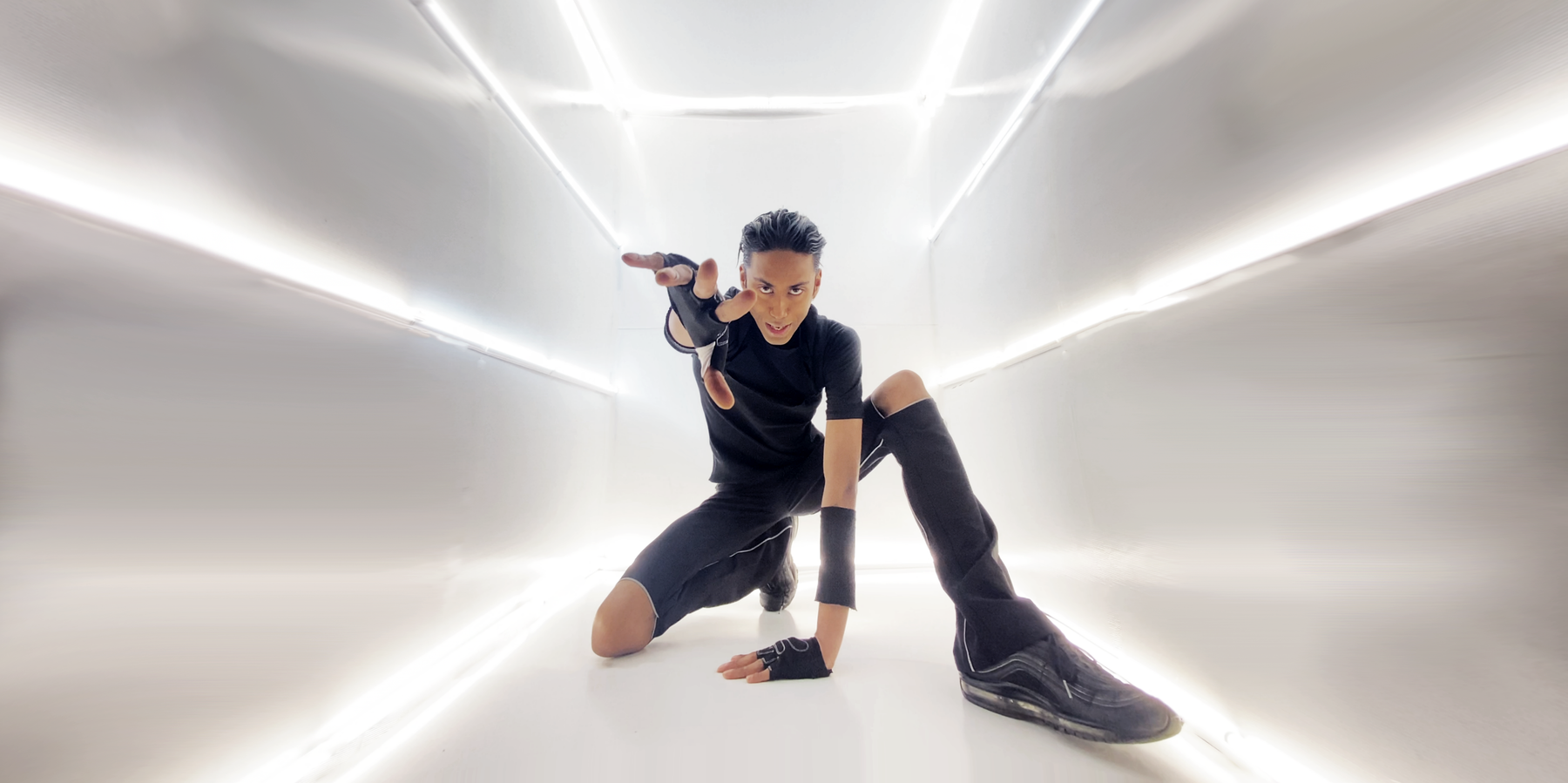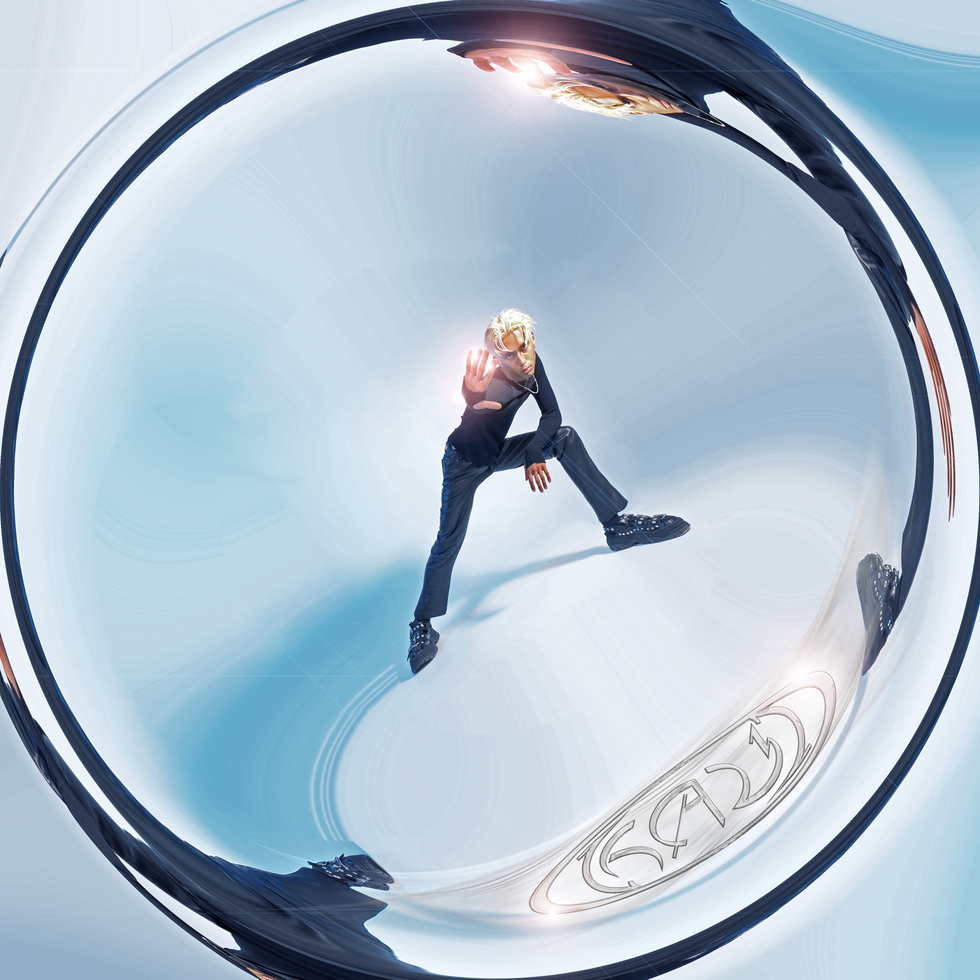
Some of the greatest songs come from extreme repression, which Kavi (real name: Karvesh Pillai) knows all too well. Having grown up in a conservative Hare Krishna environment, the rising Malaysian-born musician's family kept him protected from the types of entertainment that other kids his age indulged in across the globe. It wasn't until he later moved to Australia and embarked on an eye-opening trip to Berlin that Kavi's worldview opened up to more queer, liberated points of reference.
Which is why Kavi's new single, "REALITY TV," feels like an explosion of pent-up energy, packed with allusions to iconic moments in pop culture and classic tropes seen throughout film or TV. The music video looks like a studied interpretation of Michael and Janet Jackson's "Scream," which would later become the foundation for all early aughts visuals, from Britney to boy bands. And his lyrics bring to life tumultuous relationships like those seen in soap operas or Love Island.
Related | We Love New York!
Despite it being a melting pop for glossy mainstream obsessions, "REALITY TV" was born out of a decidedly DIY world. While living in lockdown in Sydney, Kavi was unable to visit his parents in Melbourne and used the time in isolation to focus on music. He built the entire video set by hand in his garage, and singlehandedly styled, filmed and edited it alone, all "fueled by plenty of tears and caffeine," as he jokes.
The result is a perfect companion to Kavi's hyperactive Rino Darusman-produced track, with distorted vocals and a clubby, tech-house instrumental. On it, the musician sings about his addictions, social suicide and willfully drumming up drama. "G-g-get the cameras, hit the lights, let's break the ratings tonight," he sings, paralleling his love life to the intentions of attention-hungry reality stars.
Below, PAPER catches up with Kavi to talk about everything from western media to Keeping Up With the Kardashians and sticking by his creative vision. Because if there's one thing "REALITY TV" has shown him, it's that he can do anything he sets his mind to — even "with close to zero braincells" left.
You started listening to more "mainstream" music when you were in late high school. Who were some of those artists and how do you think this delay impacted the music you make today?
So much Lorde and Halsey, I was a mid-2010s Tumblr boy. These artists actually made me want to start trying to write music and I still feel the immense influence they have on my songwriting now. The lyricism of their debut albums had this air of honesty, and I remember being drawn to their ability to glamorize suburbia and weave mundanity into these vast electro-pop worlds. Big commercial Top 40 pop was what was most accessible to me and, because it was all I listened to for years, it became incredibly foundational in the music I make now. My love for big pop hasn't ever faltered, and I don't think I ever want my music to be anything else but big, vast and able to take up as much space as it can.
Do you think there are any positives to being sheltered from western media and pop culture for so long in terms of how you now approach art?
I used to harbor a lot of resentment whenever musical references I couldn't understand would surface in conversation, but I see it as a blessing now. I feel like there's so much music for me to discover and be inspired by, outside of the parameters of a kid in the backseat listening to their parents' favorite radio station, and rather in the context of an artist who wants to be able to pull from iconic moments of pop culture to create something current and fresh. I genuinely don't know what a lot of old Kylie or Britney or Gwen sounds like, and it's such a special feeling knowing that there are these much-loved sonic worlds waiting for me to immerse myself in when I'm ready to create music outside of what I know now.
How has making music fostered your relationship with queerness? What have you discovered about yourself along the way?
I think a huge aspect of creating and releasing music — or any sort of art — is being prepared for criticism. The deeper I got into this project, the more I realized I needed to trust my gut and have a tough skin if I wanted to commit to building any degree of musical success. Having grown up in an environment in which I needed to continuously edit myself, the experience of this project has been about so much more than the music. It's been about saying, "Fuck it," and committing to living authentically and taking the scary leaps in achieving what I want.
You say a trip to Berlin really kickstarted your personal and artistic journey. Do you have a specific memory from that experience?
My first night out at the KitKatClub. I had worn all white in a sea of black, and kept being complimented by strangers on what they assumed was a statement? (It wasn't a statement, I just hadn't done my laundry but really wanted to go out). I made it home in time for lunch the next day, but it was that night that I discovered what a completely unfiltered queer community looked like. It played a hugely pivotal role in my journey of finding the comfort in my identity that I have today, both artistically and personally.
What reality TV shows did you watch while in lockdown? Were there some you connected with more than others?
Keeping Up With the Kardashians had me in a chokehold during last year's lockdown, when I began writing the track — it's actually where the concept for it began. I was hooked on the glamour and melodrama of the evolutions and ends of relationships playing out on-screen, where otherwise inconsequential slip-ups were warped into month-long storylines. I graduated to the Real Housewives of Beverly Hills in lockdown this year. The cast dynamics are so much more iconically unreasonable and the addiction hits harder. It also helps in scoping out my future neighborhood.

When you started to develop your sound with your producer, what references did you think about?
I've pulled up my Spotify playlist of reference tracks I took into my first "REALITY TV" session with my friend Rino Darusman, who produced the track: "Kaiko" by Djedjotronic, "Boo! Bitch!" by Kim Petras and Nicki's "Whole Lotta Choppas" were key initial influences. In terms of my wider musical sound, Charli and Gaga are huge inspirations in how tastefully they're able to straddle the worlds of pop and club music, while Shygirl and Sega Bodega have their hands around my neck with their ability to remain so sonically consistent, yet feel so fresh with every release. They can step on me whenever they'd like. My incredibly talented friend Ninajirachi is someone I look up to back home, alongside Australia's own Tkay Maidza. Beyond their crazy good music, their dedication to their art and their work ethic is something I strive to cultivate within myself.
Is this single reflective of the sound for what you have coming out next?
Each track of the larger project I'm working on draws upon a different facet of the wider electronic-pop club queer scene that I am so in love with and inspired by. I want the project to be a representational cross-section of this universe, while making it very Kavi. While the next single remains within a similar vein to "REALITY TV," I'm super excited to be able to show off a slightly more pop-leaning sound.
This video was very DIY. Talk through that entire process and all the challenges you encountered to make it happen in lockdown.
I had begun reaching out to local Eora/ Sydney-based creatives that I wanted to work with on the video in June, and at the end of the same week, the city's lockdown was announced. I remember having a day that weekend where I was debating whether attempting to DIY a video was worth it. I decided that the visual aspect of my musical identity was incredibly important to the project and that I'd worked too hard on the track to completely forgo the plans I had around shooting a video for it.
I started building the set in my garage. Getting bits of it home from hardware stores was fucked. I embody the queer boy who can't drive stereotype, so the first couple days largely consisted of stressful bus trips and Uber rides. I self-shot the video on a tripod, and I styled it myself, cutting up department store t-shirts and borrowing pieces from my housemate Millie Skyes, who is an out of the world stylist.
My biggest hurdle came in the editing process. I'd completely underestimated how much work it'd require, and convinced myself I'd be able to finish the edit in a weekend. I had to learn how to use Premiere Pro from the ground up, ended up spending weeks pulling my hair out at 2 AM in front of my laptop, and had to push the initial release date for the track.
Looking back on this video and single, what're you most proud of?
Sticking by my vision. The past couple months have been the toughest of my life and my mental health reached an all-time low. I'm insanely proud of myself for being able to have pulled myself out of bed every morning to work towards something I knew I was capable of pulling off, regardless of how difficult it was. I discovered a newfound confidence in my capabilities as an artist through this experience, and it's only motivated me to work harder and dream bigger. I've adopted a different attitude to every challenge I face with the rest of the project now. If I could execute "REALITY TV" with close to zero braincells, I think I can do anything I set my mind to.
Stream "REALITY TV" by Kavi, below.
Photo courtesy of Kavi